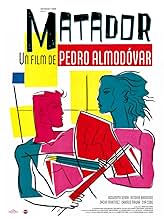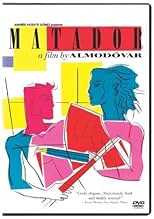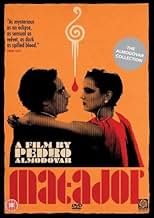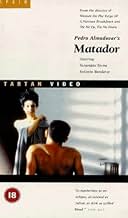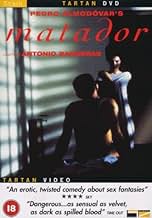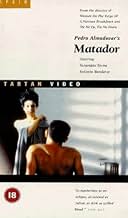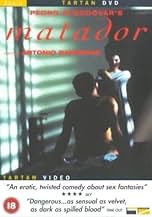Torero in ritiro e avvocatessa s'incontrano, si amano, si uccidono nell'attimo del piacere. Melodramma sulla corrida tutto sopra le righe dove gli esseri umani sostituiscono i tori, con un s... Leggi tuttoTorero in ritiro e avvocatessa s'incontrano, si amano, si uccidono nell'attimo del piacere. Melodramma sulla corrida tutto sopra le righe dove gli esseri umani sostituiscono i tori, con un sottofondo di ironia provocatoria. Amore e morte in una Spagna divisa tra rock e Opus Dei.Torero in ritiro e avvocatessa s'incontrano, si amano, si uccidono nell'attimo del piacere. Melodramma sulla corrida tutto sopra le righe dove gli esseri umani sostituiscono i tori, con un sottofondo di ironia provocatoria. Amore e morte in una Spagna divisa tra rock e Opus Dei.
- Regia
- Sceneggiatura
- Star
- Premi
- 6 vittorie e 7 candidature totali
- Diego
- (as Nacho Martinez)
- Vendedora Flores
- (as Bibi Andersen)
- Periodista
- (as Veronica Forque)
- Alumna 3ª
- (as Mercedes Jimenez)
- Alumna 4ª
- (as Francesca Romana)
Recensioni in evidenza
As the implications of the title would suggest, the film's narrative is bolstered by numerous references, both spoken and visual, to the obvious role-play and iconography of the bullfight. It is also a film about violence, and the sexuality of violence; an uncomfortable idea that is reinforced by the film's provocative opening sequence, in which we find the central matador of the title, Diego Montes, masturbating to violent scenes of exploitation cinema. The scene establishes the nature of the matador, both as a character and as a social phenomenon, as well as introducing the link between sex and death that will come to form an important thematic strand to the narrative. As the story progresses, the mechanisms of the drama conspire to throw together two separate characters that come to complement the unspoken desires and murderous lust that they seemingly share with one another, with the eventual courtship and inevitable seduction presented by the director as a surrogate bullfight in its self.
Where the film falls apart slightly is in the presentation of the character played by Antonio Banderas, a hyper-sensitive, implied homosexual who idolises the matador to the extent that he actually attempts to rape his young, fashion-model girlfriend (an act that eventually leads him to confess to a string of serial killings as a result of his mother's enforced, catholic guilt). It is a complex character, impeccably performed by the young Banderas, but his appearance ultimately sends the film off on a tangent that detracts from the central crux of the drama. Though the inclusion of this subplot does allow Almodóvar the chance to make a satirical comment on the nature of everything from fashion, to religion, sexuality, etc, these themes often feel like they've been handpicked from a completely different film, not always complimenting the central story, and too often leading it in directions that in the end feel unfinished or slightly unformed. Many of these loose ends can be glossed over, while some (the last minute implication of "second sight" as suggested by a solar eclipse) really seem to come out of leftfield.
Nevertheless, these are minor criticisms that don't necessarily destroy the ultimate intentions of the film - which really only become clear in the final scene - or the fantastic direction of Almodóvar and the performances of his cast. Although Matador certainly has its flaws (not to mention its detractors), it is, in my opinion, a fine little film and one of Almodóvar's most original and audacious creations. The performances are all incredibly committed, including the central pairing of Assumpta Serna and the late Nacho Martínez, as well the fine support from Banderas, the gorgeous Eva Cobo and Almodóvar regulars Carman Maura and Eusebio Poncela; whilst the central idea behind the script and the bold stokes of the director's intuitive grasp of the various film-making processes further refines and develops a number of themes that have come to be at the forefront of Almodóvar's career for the last twenty-five years.
The personality of ex-matador and his behaviour underlined by his words - 'to stop to kill means to dye for me', on the other hand a high class woman being 'infected' with death, treating Diego as her God of Death, and these two 'lost worlds' slowly approaching each other into a fatal bitter end, which was filled with the most beautiful tune ever made (Esperame en el cielo mi corazon...) all this creates an unforgettable and distinctive impression after watching this movie.
Pedro Almodovar you gave us a great piece of art, I believe there are some more pictures that you can bring to us in the future.
Thanks Pedro..............
In other words, it's one of Almodóvar's movies about the weird kinks of the world. This time, however, he is not concerned with the people at the edge of Spanish society, but at the center of the normal world... assuming there is such a thing. We are all weird, we all act outside the norms, and the people we respect can be the most bizarre.
It's rather slow-moving for one of his movies, probably because this is not one of his shock comedies - although there are comic elements. Visually, it is sumptuous, with a focus on colors, particularly bright reds that draw one's eyes. Miss Serna is a sharp dresser, and she wears a cape in several scenes, which she whirls like a bullfighter going in for the kill.
Is Almodóvar decrying bullfighting? Or in favor of consensual activity of whatever sort? Has he simply presented his bizarre story, and left his audience to draw the moral conclusions it chooses? Or is this simply the sort of story he likes to tell? I think the last is true, but there's nothing simple about it.
Although many of the major themes of passion, sexual desire and ambiguity, relation between love and death are already present the movie is somehow simpler in action and easier to watch than some of the later films. The story of two sexual predators and murderers, united in life by the passion for bull fights and in death by their passion for each other is acted with accuracy by a good team of actors and directed with an already recognizable style by Almodovar. The hand of the young master is certainly already there, and the film ages well 20 years after is premiere.
The performances make this decidedly odd film work. Assumpta Serna is great as the lawyer, while Antonio Banderas makes an early appearance as her client. Carmen Maura also has a small role, even though her character is somewhat lacking in development. The characters remain convincing even as the plot spins into the out right bizarre.
Some viewers might complain that the film's explicit sex and violence make it little different from an exploitation film, and indeed it opens with a character masturbating to a slasher movie. Furthermore, its commentary on sex and violence at times seems pretentious. However, the film is far more creative and well made than any exploitation film, and is well worth your time.
Lo sapevi?
- QuizOne of the films that Diego Montes is masturbating to in the Opening Sequence is Mario Bava's Sei donne per l'assassino (1964).
- Citazioni
Francisco Montesinos: I've told you not to shoot up in the dressing rooms!
- ConnessioniFeatured in Playboy: The Story of X (1998)
I più visti
- How long is Matador?Powered by Alexa
Dettagli
- Data di uscita
- Paese di origine
- Siti ufficiali
- Lingua
- Celebre anche come
- 鬥牛士
- Luoghi delle riprese
- Viaducto de Segovia, Madrid, Spagna(Bridge where Maria and Diego talk.)
- Aziende produttrici
- Vedi altri crediti dell’azienda su IMDbPro
Botteghino
- Lordo Stati Uniti e Canada
- 279.394 USD
- Fine settimana di apertura Stati Uniti e Canada
- 13.399 USD
- 13 ago 2006
- Lordo in tutto il mondo
- 286.126 USD

